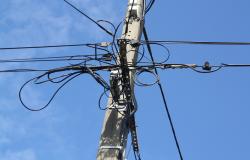There are now Four Competing Visions of the Internet. How Should they be Governed?

Kieron O'Hara and Wendy Hall ask what kind of governance arrangements are needed for a world with four internets.
On the fringe of the 2019 World Economic Forum gathering at Davos, trade ministers from 75 members of the World Trade Organisation, between them responsible for 90% of global trade, issued a joint statement on the governance of electronic commerce. The Americans were with them in spirit, although (thanks to a government shutdown) they didn’t turn up.
Nevertheless the 76 agreed to begin negotiations, under WTO conditions and building on existing WTO commitments, on the trade-related aspects of e-commerce. In the words of the Chinese Ministry of Commerce, WTO rules will serve “the revitalization of the WTO negotiating function and the necessary reform of the WTO, and will help the WTO better respond to calls from the industry and boost the confidence of all in the multilateral trading system and economic globalization at large”.
This certainly matters. In China alone, e-commerce has outpaced even the most optimistic estimates, and is probably already worth in excess of $1 trillion. On Singles Day 2018, Alibaba’s Tmall platform reportedly hosted sales in excess of $30bn. Growing the industry still further across borders could have extraordinary effects - consider, for example, the integration of the Chinese diaspora into current Chinese e-commerce platforms - but gridlock at the WTO, which requires consensus for agreement, has meant that some nations, such as India and South Africa, have been able to block progress toward lifting barriers to digital trade.

The informal Davos meeting was intended to begin a process where a like-minded group could use WTO structures to dodge the refuseniks and go it alone with sufficient critical mass to make a difference. The opponents of change represent the majority of nations in the WTO, but only a small minority of world trade. They would prefer to stick to the letter of the WTO’s 1998 program on e-commerce, which established a series of exploratory investigations to understand the trade issues related to e-commerce, without mandating specific action or the setting of any binding trade rules; in effect, kicking the issues into the long grass.
Some countries, for example, take a mercantilist position. One commentator for The Hindu newspaper argued that “despite the freezing weather in Davos” developments “have turned the heat on India”. E-commerce will create stupendous amounts of data, but “if India is compelled by any future agreement at the WTO to allow unrestricted free flow of data across borders, then its ambition in the high-value digital segment would take a hit. In such a scenario, the country would be unable to monetise the raw material of the digital economy and would be reduced to becoming merely a consumer of digital products”.
Data nationalism would be a hard road - India’s government would in all likelihood be pressed to take part in these negotiations by its flourishing IT sector and its major multinationals - and the declaration itself includes warm words about the “unique challenges” faced by developing nations.
It may prove impossible to hold the mercantilist line anyway. As argued recently by Niall Ferguson, as data flows across transnational networks, traditional hierarchies and autarkies have historically floundered. Nevertheless, the use of data by foreigners surely does not preclude its use within the originating nation as well.
There are certainly interesting issues concerning the flow of data across borders, as argued by Susan Aaronson in a recent paper for the Centre for International Governance Innovation (CIGI). Transnational data is sometimes, but not always, associated with a transaction or exchange. Much of the data, as personal data, is sensitive, but is out of the control (or even knowledge) of the data subjects. The transactions or other data-creating events are hard to pin down to a location, can be hard to trace, and are difficult to categorise as imports or exports (and therefore complex to regulate under current trade rules). Most importantly, the flow of data depends upon the internet - and so the extent of the benefits incurred by any nation will depend on the maintenance and evolution of the internet, what it is able to achieve, and what it ought to be enabled to do.
Ah, but there’s the rub, because there isn’t a consensus, even within the large trading nations who want to regulate and liberate e-commerce, on what the internet is and what it is for. Internet governance is a delicate creation woven from many informal agreements, ad hoc arrangements and temporary fixes that between them somehow carry the immense weight of our digital space. Far-sighted pioneers such as Vint Cerf and Tim Berners-Lee designed key components to be flexible enough to scale, and practical enough not to fall over. But the internet, and key applications like the world wide web, are not fixed infrastructure like roads or scaffolding. They embed values, and are subject to scrutiny, competition and critique. The internet isn’t just a neutral pipeline along which data flows; it implements a vision – or, more precisely, a number of competing visions.
In our recent paper for the CIGI, Four Internets, we argue that (at least) four such visions have reached a threshold of influence, thanks to the geopolitical support they receive from regional, national and transnational actors. This does not mean that the internet is fragmenting (although, down the line, it may) – these four internets co-exist, if not in harmony, at least with a measure of peace. Each internet vision can be associated with a world power, although that does not mean that these powers espouse a pure version, or that other nations don’t share many of the ideas and ideals.
1) Silicon Valley’s open internet. This is the techies’ version – an anarchist paradise without restrictions on the flow of data. Data wants to be free.
2) Beijing’s paternal internet. Paternalists see the internet as properly a servant of the public good – which is defined, of course, by the paternalist him- or herself.
3) Brussels’ bourgeois internet. The EU would like to maximise freedom online, but would also prefer that everyone on it behaves well, tells the truth, doesn’t troll, respects privacy, and so on. Regulation is the answer to excess.
4) Washington DC’s commercial internet. In DC, cyberspace is just another kind of space, populated by data, which is just another kind of resource. If we want innovation and value-creation, then we should grant property rights, and let the market do its work. If data is the new oil, then drill, baby, drill.
These ideologies push and pull the internet, with some openness over here counterbalanced by some regulation over there. Indeed, that there were two separate and competing US visions was not obvious until recently; only occasionally did these two libertarian visions clash, for instance over net neutrality. The growth of right-wing populism, with its loathing for Silicon Valley values, has made this clearer. And, to complicate things still further, there is a fifth vision, or perhaps counter-vision:
5) Moscow mule model. Not only Moscow, of course – all countries indulge in misinformation. But some, with little regard for or interest in international order, have made a specialism of undermining norms of truth-telling, even automating the spread of garbage. If other nations are fool enough to rely on a system with vulnerabilities, Mr Putin and others are not fool enough not to exploit it. Last month, Facebook and Twitter announced that they had disrupted a coordinated influence operation from Russia together with Venezuela and Iran. Russia, meanwhile, is reportedly taking steps to test the independence of its internet by routing all traffic through its regulator Roskomnadzor’s exchange points, temporarily cutting itself off.
In a world with four internets, can we expect agreement on cross-border data flows, even given the immense benefits that the 76 countries can expect? The Europeans might want regulations against spam. Silicon Valley would prefer that digital resources whizz through customs unmolested – but how would Mr Trump in DC respond to that, especially if the resources were whizzing into the US? Will the French (and the Cannes Film Festival in particular) be prepared to drop their counter-insurgency measures against Netflix?
Both American camps might support a ban on requirements to store citizens’ personal data on local servers – would the EU or China, concerned about their citizens for perhaps different reasons, agree? Would China see a global data space as a means for allowing the US tech giants to circumvent tedious national regulations? Would the EU put the free flow of data before what it considers to be the human right of privacy? Or before the smooth running within the EU of its proposed Digital Single Market? Are the Chinese (or the Indians, for that matter) likely to drop their insistence that data is a national security matter?
And what kind of arrangements do the hackers, spoilers, and cybercriminals, prefer? For them, confusion works better than consensus.
The move from the full WTO to the interested subset will shift the debate forward, and, as the Hindu’s columnist said, will put pressure on countries like India, South Africa and Indonesia to fall into line. This is a crucial debate, not least because about 50% of the world’s population is online - which means that further significant growth is only possible among the remaining 50%, who are clustered in such highly-populated nations outside the group of 76.
Kieron O'Hara Senior Research Fellow, University of Southampton and Wendy Hall Director, Web Science Institute, University of Southampton .
This post first appeared on the World Economic Forum's Agenda blog.
Image credit: rellob via Flickr (CC BY 2.0)


